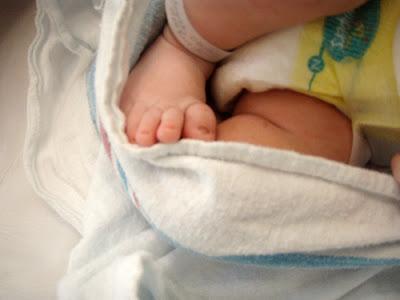Importance of Regulating Baby's Temperature
 Image via Flickr by
Daquelle manera
Image via Flickr by
Daquelle manera Research shows the chances of a baby having Sudden Infant Death Syndrome (SIDS) increases with their rising body temperature. Keeping layers on your baby and swaddling them in improper temperatures can have devastating effects. Just keeping a fan on in your nursery may reduce the likelihood of SIDS by around 70 percent.
Determining the Correct Temperature
Most experts recommend that rooms where baby sleeps be kept between 65 and 74 degrees Fahrenheit. Figuring out the perfect temperature for your infant is tricky, though. A good way to find out if your baby is too hot or cold is the "Tummy/Toes Test." If your baby's tummy and toes are warm, your baby is likely too hot and may even be overheating. If baby's tummy and toes are both cool to the touch, your baby is probably too cold. When the temperature is about right, a baby's toes are cool and the tummy is slightly warm.Set the Temperature
Keeping your home a few degrees cooler at night is one of the most successful ways to help your baby sleep through the night, which is something all parents can appreciate. Using a programmable thermostat for your HVAC system is a great way to make sure the temperature is just right. If it is difficult to keep the temperature consistent throughout your home, consider installing an individual unit for your nursery. Set the thermostat a few degrees higher during the day. At night, make sure the AC system bumps the temperature down at least 2 to 3 degrees. Research shows that is it safer for your baby to be a little too cold than it is for him or her to be too hot.Decreasing Humidity
Humidity is another thing to consider while you're creating a nurturing environment for your bundle of joy. During the summer, humidity in your home can cause unpleasant odors and lead to dangerous mold problems. If you live in a hot and humid state, you need to be diligent in order to keep your home's humidity with in the EPA's suggested range, between 30 and 50 percent. To reduce humidity, use a dehumidifier and/or humidity absorbing plants, like the Boston Fern.Increasing Humidity
Low humidity can cause problems like dry eyes, sore throats, cracked skin, and sinus infections. Viruses live longer and are more easily passed at low humidity levels. Peeling wallpaper, dry plants, itching skin, and static electricity are all indications of low humidity. Increasing humidity is easy when you use a humidifier, but use only distilled water and clean the humidifier after each use to prevent the spread of dangerous viruses and bacteria.Keeping your baby happy makes life easier for you. Finding the right temperature and humidity level for your baby takes a little work, but the benefits ar
If you enjoy my blog, please consider following me on Bloglovin'
